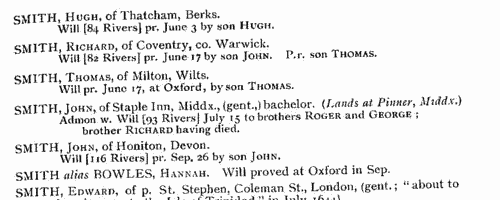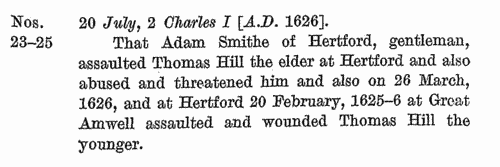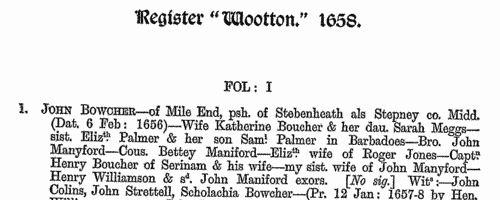Andrewe Surname Ancestry ResultsOur indexes 1000-1999 include entries for the spelling 'andrewe'. In the period you have requested, we have the following 62 records (displaying 51 to 60): Single Surname Subscription | | | Buying all 62 results of this search individually would cost £304.00. But you can have free access to all 62 records for a year, to view, to save and print, for £100. Save £204.00. More... |
These sample scans are from the original record. You will get scans of the full pages or articles where the surname you searched for has been found. Your web browser may prevent the sample windows from opening; in this case please change your browser settings to allow pop-up windows from this site. Lancashire and Cheshire Marriage Licences
(1624-1632)
Licences for intended marriages in Chester archdeaconry, which covered Cheshire and Lancashire south of the Ribble (by far the most populous part of that county)ANDREWE. Cost: £4.00.  | Sample scan, click to enlarge

| Inhabitants of Cambridge
(1504-1635)
Cambridge comprised fourteen ancient parishes, plus the university (which was extra-parochial), in the diocese of Ely. The church of St Mary the Great (as opposed to St Mary the Less) in the Market Place (juxta forum) has churchwardens' accounts surviving from 1504 onwards. Those from 1504 to 1635 were transcribed by J. E. Foster for the Cambridge Antiquarian Society and published in 1905. The two churchwardens were chosen annually: the previous year's churchwardens each chose another parishioner: those two then each chose three other parishioners: the resulting eight then chose the new year's churchwardens, the wardens of the Light of the Rood, and the wardens of the Mass of Jesus. Auditors were also chosen, usually out of the eight, to examine all the wardens' accounts at the end of the year. The churchwardens' accounts are largely concerned with the costs of repair of the church and its furnishings, and include the names of tradesmen and workmen. Each Easter a rate called Easter money was raised was raised from all householders in the parish, and additional rates are occasionally levied for unusual expenses, such as steeple reconstruction. These 'Easter book' lists give a complete list of householders for the parish, excepting the poor. The church's income also included the rents from some houses in the parish, and the names of the tenants appear. The offices of the Light of the Rood and the Mass of Jesus were abolished during the Reformation. The accounts of the Light of the Rood, i. e., for candles burnt before the crucifix, often include a list of sums received for funerary diriges (dirges) for the year, from which the year of death of the more prosperous parishioners can be traced in this early period. ANDREWE. Cost: £4.00.  | Sample scan, click to enlarge

| Wills proved at York: Names of Testators
(1627-1637)
The diocese of York comprised most of Yorkshire, and Nottinghamshire: the York Exchequer court was the ordinary probate jurisdiction for the Yorkshire part of the diocese, but some wills from Nottinghamshire and other parts of the province of York were also proved there. Dr Francis Collins compiled this index to the transcribed wills of the Prerogative and Exchequer Courts in the York registry proved from 1627 to 1637. The date on the left is that of probate; the testator's full name is then given (surname first), parish or place of abode, and sometimes occupation, and date that the will was executed; and volume and folio number where it the transcript commences. The Act Books were used by Dr Collins to supply deficiencies in the information from the transcripts.ANDREWE. Cost: £2.00.  | Sample scan, click to enlarge

| PCC Probates and Administrations
(1646)
The Prerogative Court of Canterbury's main jurisdiction was central and southern England and Wales, as well as over sailors &c dying abroad: these brief abstracts, compiled under the title "Year Books of Probates", and printed in 1906, usually give address, date of probate and name of executor or administrator. They are based on the Probate Act Books, cross-checked with the original wills, from which additional details are, occasionally, added. The original spelling of surnames was retained, but christian and place names have been modernised where necessary.ANDREWE. Cost: £2.00.  | Sample scan, click to enlarge

| Hertfordshire Sessions
(1619-1657)
Incidents from the Hertfordshire Sessions Books and Sessions Minute Books. These cover a wide range of criminal and civil business for the county.ANDREWE. Cost: £4.00.  | Sample scan, click to enlarge

| Prerogative Court of Canterbury Wills: Huntingdonshire: Strays
(1658)
William Brigg compiled abstracts of all the wills in Register "Wootton" of the Prerogative Court of Canterbury. The abstracts of those proved in 1658 were published by him in 1894. The court's main jurisdiction was central and southern England and Wales, as well as over sailors &c dying abroad. We have re-indexed the whole volume, county by county, for both testators and strays (legatees, witnesses and other persons mentioned in the abstracts). ANDREWE. Cost: £4.00.  | Sample scan, click to enlarge

| Lancashire and Cheshire Marriage Licences
(1667-1680)
Licences for intended marriages in Chester archdeaconry, which covered Cheshire and Lancashire south of the Ribble (by far the most populous part of that county)ANDREWE. Cost: £4.00.  | Sample scan, click to enlarge

| Testators and legatees in London
(1358-1688)
The Court of Husting of the city of London sat (usually on a Monday) each week: among its functions was the enrolment of deeds and wills relating to citizens of London. In their strictest technical sense the terms 'will' and 'devise' are appropriate to real estate, and the terms 'testament', 'bequest' and 'legacy' to personal estate, but this distinction is lost sight of in ordinary usage. This calendar of wills proved and enrolled in the Court of Husting was edited by Reginald R. Sharpe, records clerk in the office of the Town Clerk of the City of London, and printed by order of the corporation in 1890. The date of the court is given in italics, with the year in bold in the margin. The testator's name is given in capitals (surname first, in bold), and then a brief listing of substantial bequests, with the names of legatees, and then the date of making of the will, and reference. The bulk of the wills in this volume are from before 1600. ANDREWE. Cost: £4.00.  | Sample scan, click to enlarge

| Boys at Eton
(1441-1698)
King Henry VI founded a college at Eton in Buckinghamshire in 1440, 'to the praise, glory and honour of the Crucified, the exaltation of the most glorious Virgin His mother, and the establishing of holy Church His bride'. From this foundation has evolved the modern public school. Sir Wasey Sterry compiled a register for the college from 1441 to 1698, from a variety of surviving records, and including groundwork from his 'A List of Eton Commensals' of 1904, and R. A. Austen-Leigh's 'A List of Eton Collegers' of 1905. This resulting 'Eton College Register' was published in 1943. Because of the variety of underlying materials, the entries vary greatly in depth: some names survive only as a surname of not too certain date. In the fullest entries, the surname (often with a variant spelling) is given first, in bold, followed by the years of entry and leaving. The christian name is given next; then birthplace, and name of father. The initials K. S. (King's Scholar) indicate a scholar on the foundation. There will then follow a summary of the man's career, death, burial and probate; and the sources for the information, in italics, at the end of the entry.ANDREWE. Cost: £4.00.  | Sample scan, click to enlarge

| Freemen of Canterbury by Redemption
(1392-1800)
No man or woman could trade in the city of Canterbury without having obtained 'freedom' of the city, unless they paid an annual fee to do so. Admissions of freemen were recorded on the Chamberlains' Accounts of the city, which were prepared annually from Lady Day (25 March) to Lady Day until 1752, and thereafter each set runs from 1 January to 31 December. The accounts for 1392 are incomplete, but thereafter until 1800 there is a complete series except for the years 1455 to 1457 and the year 1552-3. Joseph Meadows Cowper, Honorary Librarian to the Corporation, produced this extract of the names from 1392 to 1800, and the volume was privately printed in 1903. There are five groups of freemen: those who obtained freedom after serving out an apprenticeship to a freeman; the children of freemen; those who married a freeman's daughter; those who claimed freedom by 'redemption', i. e. by purchase; and those who were honoured by a gift of the freedom from the Mayor and Court of Aldermen. Cowper published his lists divided into the five categories: the sample scan is from the list of those who obtained freedom by marriage. This is the index to those who gained their freedom by redemption.ANDREWE. Cost: £4.00.  | Sample scan, click to enlarge

|
Research your ancestry, family history, genealogy and one-name study by direct access to original records and archives indexed by surname.
|












